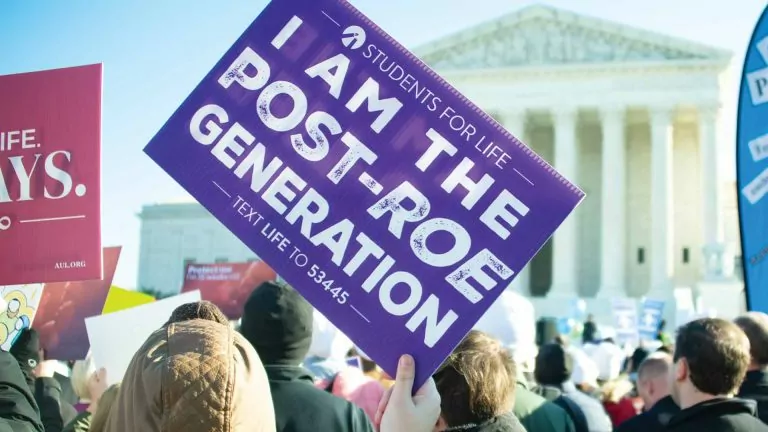Roe’s reversal shows us what God can accomplish for and through His people.
*****
“In the days when the idea of a surprise pregnancy was only an abstraction, I had never suspected that I could feel fierce love for an embryo. I wanted to discuss my mixed-up feelings with Jon, but I didn’t know how, especially since it was clear that his mind was already made up…. Whatever else I might be able to do for our child, I knew I could never force Jon to love it. Of all the pains that await us in this world, I most desired to protect it from feeling unwanted.”
This is how Jess explains her rationale for why she had an abortion. The embryo was loved but unwanted; protected from future emotional pain, but killed.
Jess’ story captures so well our culture’s cognitive dissonance regarding life in the womb. We know full well that a pregnant woman has a growing, developing human being in her womb. But we legally allow that human being to be dismembered or poisoned for any reason the mother chooses. Here in Canada, we allow that fate right up to birth. The pro-life movement exists because we see this tragedy, we seek to expose the cognitive dissonance, and we strive to save lives.
There are those who are deeply cynical of pro-life work. I’ve had many express to me how futile they think pro-life activism is in a pro-choice culture like Canada. Why the skepticism? Should we really believe that things will only get worse when it comes to abortion laws?
That opinion certainly isn’t based on historical trends. Legal slavery was ended, we don’t legally subjugate women anymore, and many oppressive regimes have been defeated. Just because a mountain is difficult to climb, and we can’t see every part of the path from where we stand, doesn’t mean that the mountain is insurmountable.
Look south of the border and ask, how many thought Roe v Wade would be overturned in our lifetime? Yet, that happened in June 2022 when the U.S. Supreme Court released their Dobbs decision which found:
“The Constitution does not confer a right to abortion; Roe and Casey are overruled; and the authority to regulate abortion is returned to the people and their elected representatives [at the state level].”
This incredibly huge win means that now individual states are free to enact near-total bans of abortion! Examining how this came to be and recognizing the power of God’s hand in human political affairs, is an encouragement and call to action for Canadians who also want to see pre-born children in Canada protected in our lifetime.
The state of affairs pre-Roe
Unlike Canada, where criminal law is passed federally, in the U.S. criminal laws are passed by the individual states. Alongside Canada and many European countries, there was a growing trend in the U.S. toward legalizing more abortions that started in the 1960s and continued in the 1970s. What I didn’t know until reading the Dobbs decision was how slowly that movement was happening in the U.S. In fact, in 1973 when Roe was decided, 30 states still prohibited abortion at all stages. Well over half the country banned abortion, regardless of the age of the pre-born child. With one fell swoop from the U.S. Supreme Court that all changed, requiring states to allow abortions before the pre-born child was viable – a standard that was preserved and modified in the 1992 Casey decision.
Now, in 2022, that decision has been reversed. The pro-life movement in the U.S. has exemplified tireless work toward this day, always striving to produce quality legal literature, educate the public, and continue to work one step at a time.
Of course, it wasn’t just the effort of the pro-life movement that brought us to this point. Had Justice Ruth Bader Ginsburg retired during President Obama’s tenure, President Trump would not have had the opportunity to appoint three Supreme Court Justices. Those three justices were needed to overturn Roe. We can praise God for granting growth and in His providence providing favorable circumstances for this huge victory. It clearly was God’s blessing, along with the faithful labor of many, that resulted in this success.
But we don’t immediately go back to where we were. We don’t see 30 states banning abortion at all stages. Ground was lost in the decades since Roe, not to mention millions of lives. All to say, this ruling is a victory, but it still comes with mixed emotions. There is still so much more that needs to be done. Yet, as Canadians we can take encouragement from the victory and take note of the work yet to do resulting from the Dobbs decision.
Dobbs and freedom

An abortion supporter carrying a “Freedom is for every body” sign that is inadvertently pro-life, sharing a message we desperately want the other side to understand.
What did Dobbs decide? If you believe one of my law school classmates, “The decision also opens the door to forced abortions. Either way, your uterus belongs to the state now.” How could someone as intelligent as this guy come to such a strange conclusion? It comes from a very deliberate framing of the abortion issue by abortion proponents.
We’ve known this for quite a while – we call ourselves pro-life because we want to emphasize that unjustifiably taking a human life is wrong. Abortion advocates call themselves pro-choice because they want to emphasize that mothers ought to be free to make choices. This was described in another abortion case in the United States, this one from 1992 and referred to as Casey. Incidentally, Casey was also overturned by the new Dobbs decision. In Casey, Justice Kennedy said, “At the heart of liberty is the right to define one’s own concept of existence, of meaning, of the universe, and of the mystery of human life.” The awful extension of having this liberty to define the mystery of human life is that mothers have had the freedom to define pre-born human beings out of existence, therefore making them discardable.
The Dobbs decision addresses Justice Kennedy’s definition of liberty head-on by trying to clarify that it is a good thing when, at times, there are limits on liberty. Such a definition of liberty cannot plausibly be absolute, the justices say in Dobbs, because “while individuals are certainly free to think and to say what they wish about ‘existences,’ ‘meaning,’ the ‘universe,’ and ‘the mystery of human life,’ they are not always free to act in accordance with those thoughts.” Liberty with such an individual source cannot be absolute. The state has a role in limiting it.
Was my classmate right then? If the State can infringe liberty, does this mean that states are now able to force abortions? Certainly not by the logic in Dobbs. Liberty is important and does require a justification to be impinged. The justification is present here because according to Dobbs, “Abortion destroys what those decisions call ‘potential life’ and what the law at issue in this case regards as the life of an ‘unborn human being.’”
That is, you have the freedom to do so much, but you don’t have the freedom to take a life. It’s quite something to see the U.S. Supreme Court say this regarding abortion.
Forced motherhood
The pro-abortion side is insistent that this is an unjustifiable limitation on women’s freedom, sometimes utilizing the term “forced motherhood.” The idea is that abortion restrictions are forcing women to become mothers by not allowing them to end a pregnancy.
Early feminists were also concerned about forced motherhood, but they had a very different concept of what that meant. In their view, the motherhood was forced if the sex was forced. The problem was never the child who resulted from the sex – the problem was the man who did not respect the woman. And certainly, the child should not forfeit their life to alleviate the parents from the consequences of their actions.
So much of the language has been twisted when it comes to discussing abortion. When a woman chooses whether to give birth or whether to have an abortion, the choice is not whether or not to become a mother. Once pregnant, the freedom to choose to be a mother is, in the words of C.S. Lewis, “Free, as a man is free to drink while he is drinking. He is not free still to be dry.”
Once pregnant, a woman is a mother – she cannot choose otherwise. It isn’t the law that forces that choice, it’s biology. She can end her pregnancy by ending the life of her child, but that does not rewind the clock back to before she became a mother. Sex comes with the potential for procreation. Once procreation has occurred you can kill the resulting life, but that just makes you the mother of a dead child.
Are women doomed then? It turns out, the answer is no. In fact, when women are denied the choice to end the life of their child, they don’t generally view motherhood as forced. In The Turnaway Study, researchers looked at women who went to an abortion clinic but were denied having one because they were past the gestational limit in that state. They found that women’s choices changed. Within a week after being denied an abortion only 65% of women surveyed still wanted one. By the child’s first birthday this was down to 7% and five years later it was only 4%. Remember, these are women who chose abortion. These aren’t women who just thought about abortion, these are women who made it to the abortion clinic, despite travel expenses and the logistics of actually getting there. The wanted or unwanted response to the pregnancy faded. The bond between parent and child persisted.
Children are a gift
No one is suggesting that pregnancy and raising children are easy. But it must be admitted that our abortion culture has fixated on the difficulties. Legal scholar Erika Bachiochi sums it up this way:
“Pregnancy, with all its risks and demands, is seen primarily as a burden when viewed from the perspective of the unencumbered, autonomous male. Seen from the perspective of most women, and the men who love them, childbearing is a great gift.”
Throughout all human history, mankind – men and women – have viewed the risk and hardship of pregnancy to be worth it.
For those of us who believe what God tells us in the Bible, we understand that this great gift is one that comes from our loving, sovereign Savior (Psalm 127:3). Children are entrusted to the education and care of parents but are not property to be disposed of at will (Ephesians 6:4). All parents fail to some extent, but the further promise for us and for the countless pre-born children at risk of losing their lives to abortion is that even if “my father and my mother have forsaken, but the LORD will take me in.” (Psalm 27:10).
That is the ethic the pro-life movement continues to exhibit and teach to our abortion-minded culture. The Dobbs decision demonstrates it, and it’s up to us to continue that work here in Canada.
There is no place in this work for cynicism or for giving up when we serve a God who works great and mighty wonders for and through his people.
Tabitha Ewert is We Need a Law’s Legal Counsel and a member of ARPA Canada’s Law and Policy team. Top picture credit: Rena Schild / Shutterstock.com













